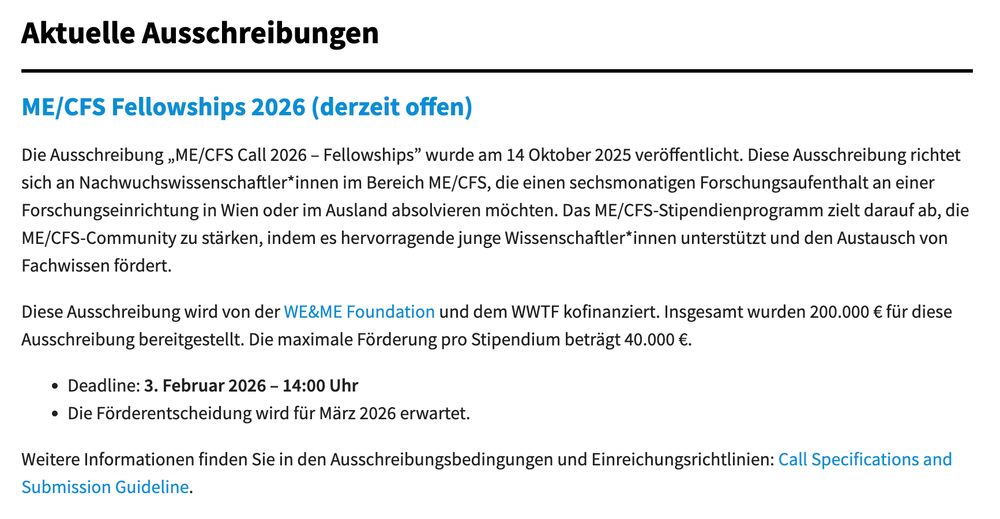Unfortunately, it's almost fully based on self-reported data and questionnaires.
There are still almost no studies that looked deeper into MCAS in ME/CFS using proper biological tests.

Unfortunately, it's almost fully based on self-reported data and questionnaires.
There are still almost no studies that looked deeper into MCAS in ME/CFS using proper biological tests.
Today, we are proud to launch the Overlapping Illness Alliance, a coalition of charities working to improve recognition, care and support for those living with complex, overlapping conditions.

Today, we are proud to launch the Overlapping Illness Alliance, a coalition of charities working to improve recognition, care and support for those living with complex, overlapping conditions.
We’ve already had over 2000 responses - thank you to everyone who’s taken part so far 🧡
Take part, read our FAQs, and find out more here: www.actionforme.org.uk/research-campaigns/our-research-work/big-survey/


We’ve already had over 2000 responses - thank you to everyone who’s taken part so far 🧡
Take part, read our FAQs, and find out more here: www.actionforme.org.uk/research-campaigns/our-research-work/big-survey/
The research team expect to complete recruitment very soon, with all participant activities completed by February next year.
meassociation.org.uk/2025/10/upda...

The research team expect to complete recruitment very soon, with all participant activities completed by February next year.
meassociation.org.uk/2025/10/upda...
They have created ME/CFS fellowships: 6-month research stays with funding of up to € 40,000.
The call is co-funded by the WWTF (a big non-profit in Vienna dedicated to research and science) and has a total budget of € 200.000.

They have created ME/CFS fellowships: 6-month research stays with funding of up to € 40,000.
The call is co-funded by the WWTF (a big non-profit in Vienna dedicated to research and science) and has a total budget of € 200.000.
Since our last update, we’ve made significant progress...."
Read in full: https://meassociation.org.uk/71q6
#MECFS #pwME #MyalgicE

I'm doing a birthday fundraiser (big birthday coming up next week). It's for the Daratumumab trial which is really exciting, via Joan Crawfords just giving page.
I think this has huge potential and needs a proper clinic trial.
Please share #mecfs
www.justgiving.com/crowdfunding...

I'm doing a birthday fundraiser (big birthday coming up next week). It's for the Daratumumab trial which is really exciting, via Joan Crawfords just giving page.
I think this has huge potential and needs a proper clinic trial.
Please share #mecfs
www.justgiving.com/crowdfunding...

www.eventbrite.co.uk/e/nihrmrc-sh...
Screenshot from latest Science for ME weekly update
#MEcfs #LongCovid #CFS #PwME

www.eventbrite.co.uk/e/nihrmrc-sh...
Screenshot from latest Science for ME weekly update
#MEcfs #LongCovid #CFS #PwME
@theguardian.com PLEASE correct this misleading headline – your article repeatedly states it's the total number of steps you take, NOT hitting a particular daily count that matters. The opposite of your headline.

@theguardian.com PLEASE correct this misleading headline – your article repeatedly states it's the total number of steps you take, NOT hitting a particular daily count that matters. The opposite of your headline.
While it's great to see so many talented people focusing on ME/CFS, we also noted that a lot of research is focused on hypotheses that are not yet supported by strong evidence.

While it's great to see so many talented people focusing on ME/CFS, we also noted that a lot of research is focused on hypotheses that are not yet supported by strong evidence.

While it's great to see so many talented people focusing on ME/CFS, we also noted that a lot of research is focused on hypotheses that are not yet supported by strong evidence.
IMHO, we need more data and measurements, less theory and speculation.
IMHO, we need more data and measurements, less theory and speculation.
1 Brings experts using cutting edge technology on other diseases to ME/CFS.
2 Finds bio action in many tissues eg brain, spinal cord, muscles, crucial if there's not much to to find in the blood.
3 Looks in living bodies, not samples in the lab
Dr. Michelle James explained that they found a striking pattern with more TSPO signal in various muscle groups of ME/CFS patients, such as the thigh and shoulders.

1 Brings experts using cutting edge technology on other diseases to ME/CFS.
2 Finds bio action in many tissues eg brain, spinal cord, muscles, crucial if there's not much to to find in the blood.
3 Looks in living bodies, not samples in the lab
Dr. Michelle James explained that they found a striking pattern with more TSPO signal in various muscle groups of ME/CFS patients, such as the thigh and shoulders.

Dr. Michelle James explained that they found a striking pattern with more TSPO signal in various muscle groups of ME/CFS patients, such as the thigh and shoulders.
Relevant to ME/CFS?
They infected mice with SARS-CoV-2, found that female mice had a stronger immune response and more cognitive problems after 84 days than males, and that this was due to overexpression of genes such as Tlr7 on the X chromosome.

Relevant to ME/CFS?
The usual brilliant summary from ME/CFS Science. Who point out the cardiac issues seen in the model might mean this gene isn't relevant to ME/CFS.
They found that these fish swim less and have reduced oxygen consumption.

The usual brilliant summary from ME/CFS Science. Who point out the cardiac issues seen in the model might mean this gene isn't relevant to ME/CFS.

Today, a letter from several experts in the field was published in the journal Nature Communications, criticising the conclusions of the original paper.

Today, a letter from several experts in the field was published in the journal Nature Communications, criticising the conclusions of the original paper.
Dr. Fridbjörn Sigurdsson, a former medical oncologist now focused on ME/CFS, speaking at the 2025 @investinmeresearch.bsky.social conference.
Thanks to @mecfsskeptic.bsky.social for finding the clip.
Dr. Fridbjörn Sigurdsson, a former medical oncologist now focused on ME/CFS, speaking at the 2025 @investinmeresearch.bsky.social conference.
Thanks to @mecfsskeptic.bsky.social for finding the clip.
The deadline for submitting your response is 27 January 2026.

The deadline for submitting your response is 27 January 2026.
(no ticket/ purchase necessary)
Link: nova.zoom.us/webinar/regi...
Copied from a new email from the IACFS/ME
#MyalgicEncephalomyelitis #ChronicFatigueSyndrome #MEcfs #CFS #PwME

(no ticket/ purchase necessary)
Link: nova.zoom.us/webinar/regi...
Copied from a new email from the IACFS/ME
#MyalgicEncephalomyelitis #ChronicFatigueSyndrome #MEcfs #CFS #PwME
It takes place in London on November 6, 10 am - 4:30 pm GMT.

It takes place in London on November 6, 10 am - 4:30 pm GMT.


